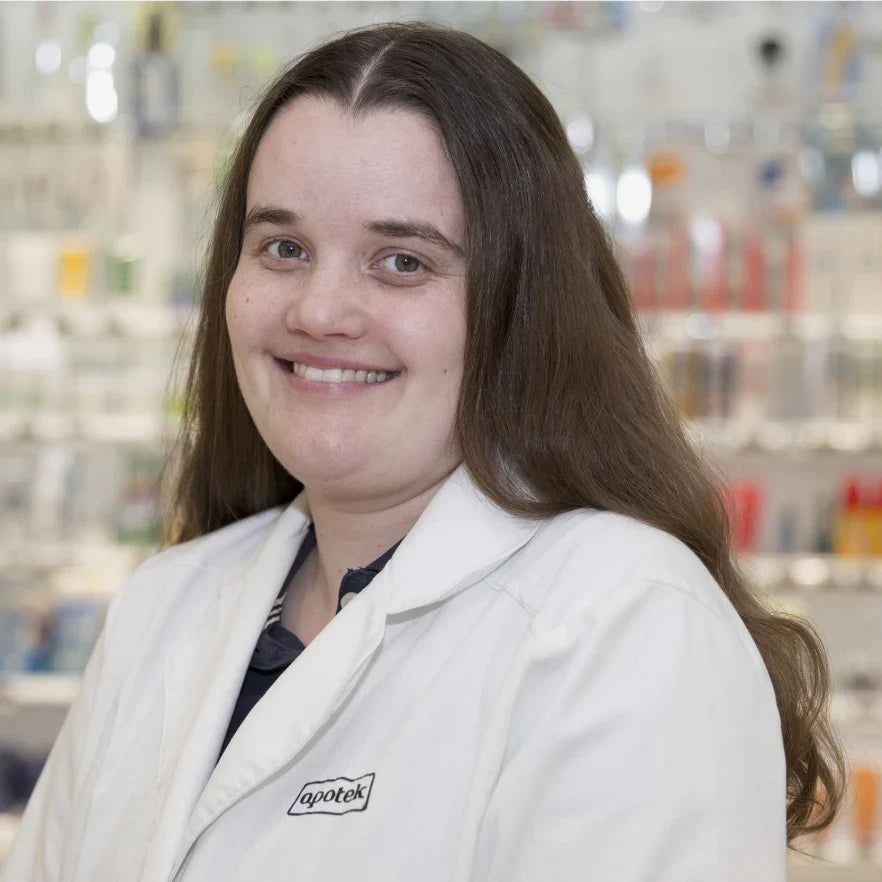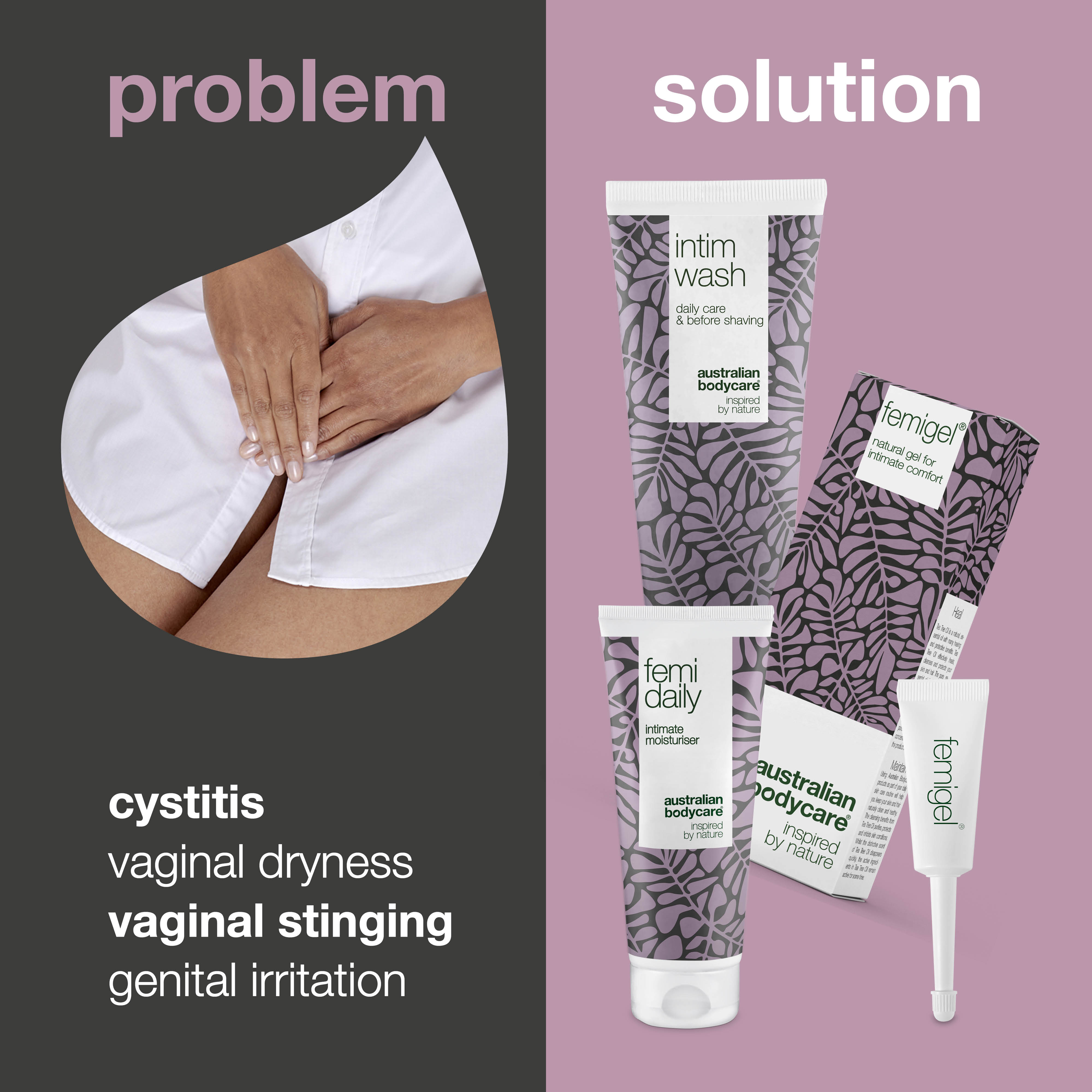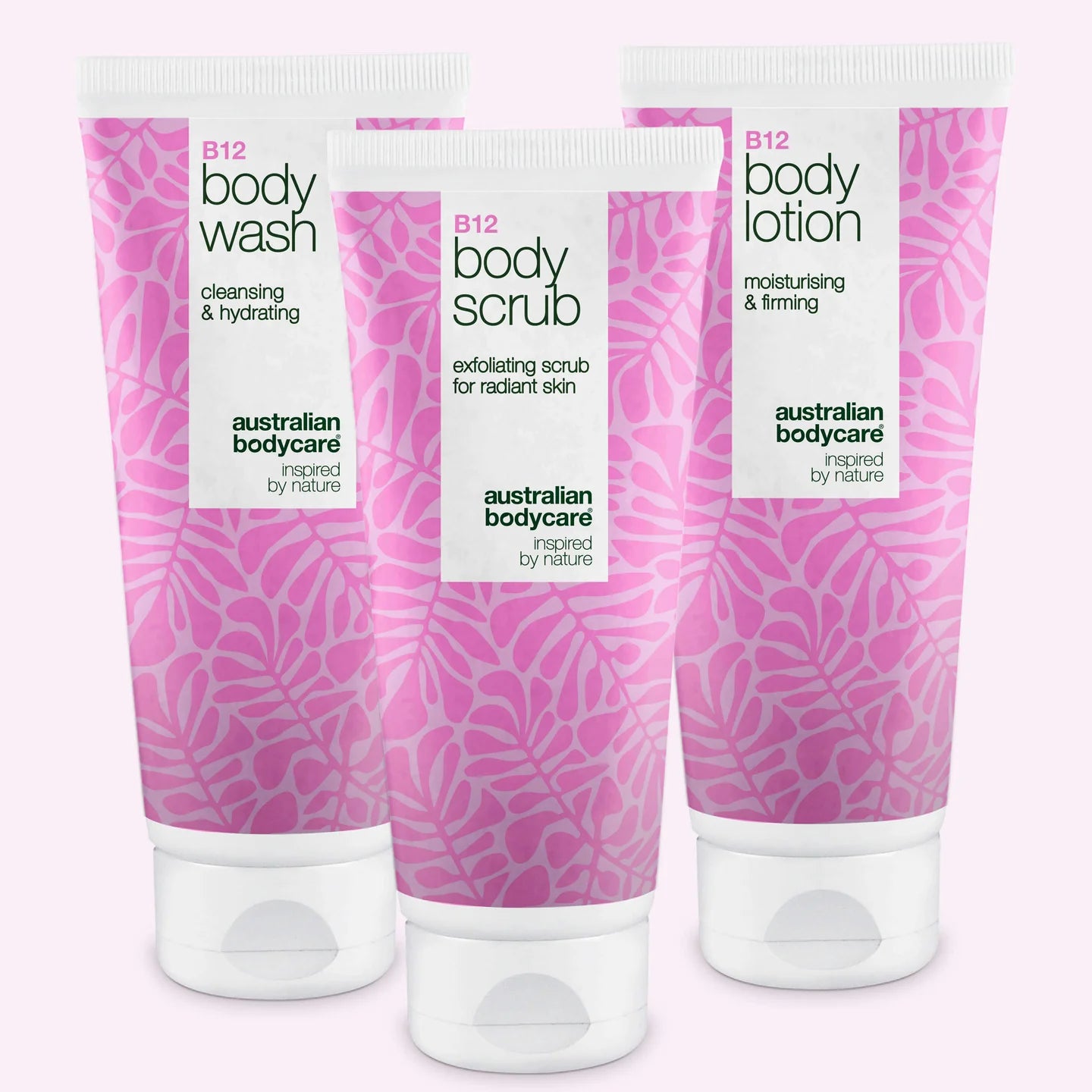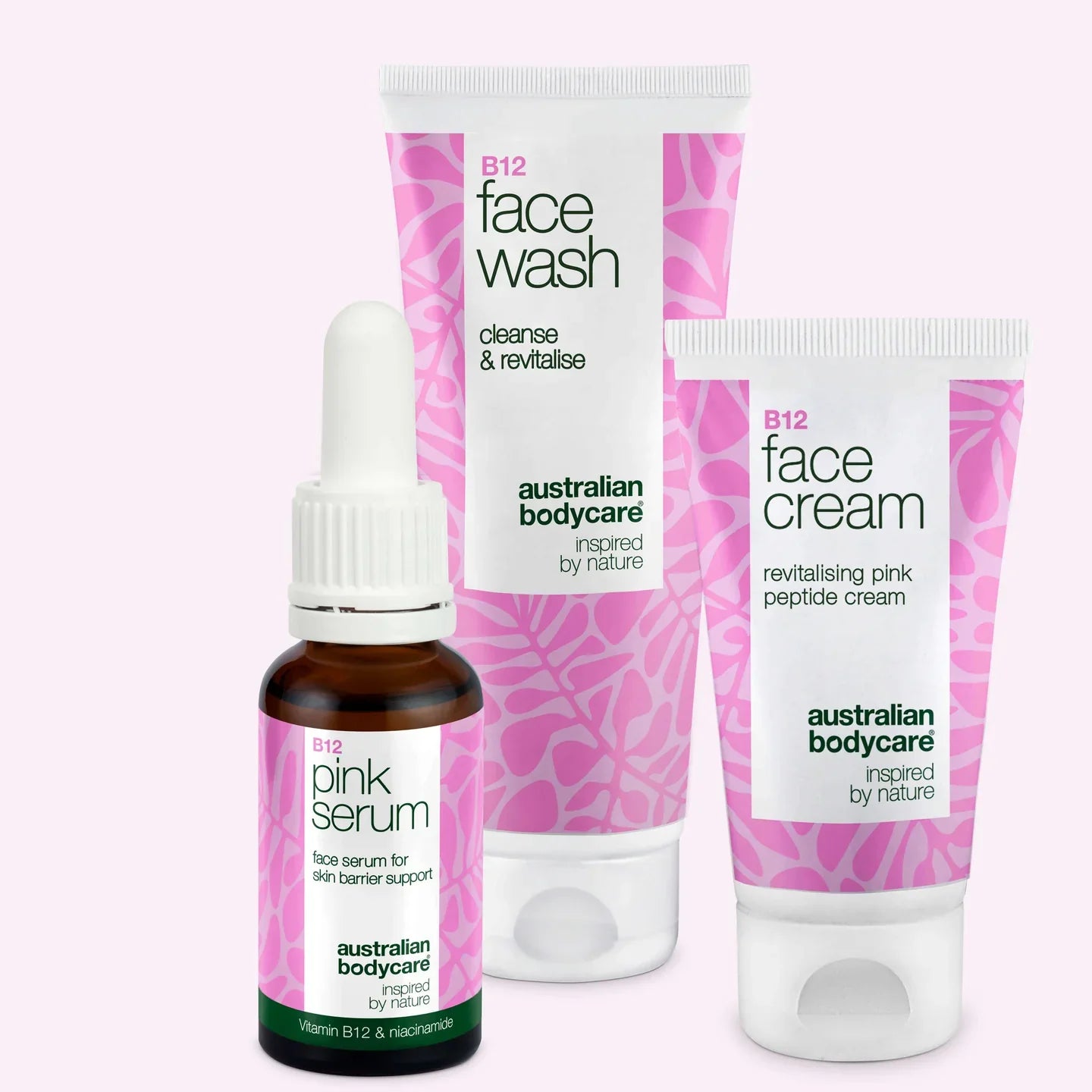When is the menopause, how long does it last, and what are the symptoms?
For many people, the menopause can be a dramatic start to a completely new phase of life. Then it is worth knowing what is really involved.
When are you actually in menopause, what are the symptoms, and how long does it go on?
These are questions many people ask themselves. You will find answers to all these questions and many more in this article, which gives you an insight into all the angles of the menopause – from help with dryness to symptoms to keep an eye on.
Table of contents
What is the menopause?
The menopause is a name for a period in which the body goes through major hormonal changes. Both partners will have a noticeable reduction in hormone levels.
During this period, women produce less of the female hormone, oestrogen, while men gradually produce less of the male hormone, testosterone.
Video: Intimate care for women during the menopause
The menopause for women
Other names for the menopause are the climacteric or the change of life. During this period, fertility declines, because the woman’s ovaries become smaller and less receptive to the hormones that control the maturing of the eggs. The eggs begin to run out, and the function of ovulation changes.
During the menopause, the hormones that are primarily affected are progesterone and oestrogen. Progesterone prepares the uterus to receive the fertilised egg, and this hormone disappears first. Next, the female hormone, oestrogen, runs out gradually when the menopause starts.
The change of life is what happens in connection with a woman’s menopause. It means that menstrual bleeding becomes lighter, and there are longer intervals between periods, until they finally stop altogether.
The menopause is when menstruation finally stops. That is why the change of life and the menopause are completely intertwined.
Many women have irregular menstruation at the beginning of the change of life. Until menstruation stops, there may be spot bleeding in connection with the menopause; menstruation may be more frequent, or more irregular, until it finally stops.
JUMP TO: Signs and symptoms of the menopause in women
Men’s menopause
Men go through a menopause too, although more problems are associated with the female menopause. Many men do not notice that they have a menopause at all, because there is no sudden change like those women experience.
The process in men is also called the andropause, which means that the testicles begin to function at a lower level. They produce less testosterone than previously.
However, production of testosterone does not stop suddenly in the same way as oestrogen production does in women; in men, production of the male hormone is reduced gradually.
JUMP TO: Signs and symptoms of the menopause in men
How long does the menopause last?
One thing is certain: The menopause will come sooner or later. It is more uncertain how long the transition lasts – because it is simply a transition.
Its length varies from one person to another. Some go through the menopause in a couple of years, while for others it takes five, or for others again it may last for more than ten years.
Thus there is no simple answer to how long the menopause lasts, as it is highly individual.
When does the menopause start, and when does it end?
The menopause usually starts between the ages of 45 and 55. On average, the menopause begins at the age of 52. This does not mean, however, that the menopause cannot start earlier or later.
In some cases it may already start in the late 20s, while for others the menopause does not start until the 60s.
Thus the age when the menopause starts varies widely, but in many cases it will be between the ages of 45 and 55.
When it ends will also depend on when it begins. If the menopause starts when you are 45, it may end when you are 55 – but it may also end when you are 48 or 50.
Quite simply, there is no single answer to when the menopause ends.
What does the menopause feel like? Signs and symptoms of the menopause in women
For both men and women, the menopause may be associated with physical and mental changes. While for some these changes are very troublesome, others barely notice the drop in hormone levels.
How do you know, then, when you have reached the menopause? The body sends out a variety of signals. Hot flushes, dry membranes, headaches and tenderness in the breasts are simply some of the body’s signals.
Here you can see an overview of the commonest signs of going through the menopause.
There are a number of problems associated with the menopause, which you can keep an eye on.
Hot flushes
One of the most frequent symptoms of the menopause is hot flushes. Heat suddenly spreads out from the face and through the upper body. For some women in the menopause, the hot flushes may be accompanied by rapid heartbeat.
Hot flushes occur when hormone levels in the body are reduced, and at the same time there are changes in the brain’s control centre for body temperature. This part of the brain, called the hypothalamus, activates the sweat glands to a greater degree during the menopause.
Hot flushes can feel embarrassing, because the face flushes, and being so hot means it is necessary to take off a blouse or jacket. How long will the hot flushes go on, then, in the menopause?
These uncomfortable hot flushes may continue for another three or four years after menstruation has stopped completely.
Disturbed sleep
Tiredness is common during the menopause, as disturbed sleep is another serious problem associated with it. You wake more often and more easily, and do not sleep nearly as deeply as before. You can easily become tired and irritable in daily life, as the lack of sleep means less energy.
Problems with sleep can be caused by hot flushes and sudden heavy sweating, which can make a good night’s sleep difficult.
Dizziness and headache
Dizziness is yet another symptom which many women experience in the menopause. The brain receives chemical messages all the time, and when hormone levels swing, they affect these signals.
At the same time, the menopause is associated with increased levels of insulin and cortisol.
All this affects the blood pressure, which can lead to dizziness and cause headaches.
Putting on weight
If you suddenly begin to put on weight while eating more or less the same as always, it may be a sign of the menopause. Many people put on weight during the menopause.
Once again, it is due to the hormonal changes in the body.
When progesterone diminishes before oestrogen, many women have too much oestradiol in the body in relation to the other hormones. Oestradiol is a ‘dangerous’ form of oestrogen, because it causes the body to store fat – right at the centre, round the abdomen. The fat cells produce oestradiol, which means you develop even more fat.
That is why many women find it difficult to lose it again once they are caught up in a vicious circle of fat.
Dry mucous membranes
Dry mucous membranes in the nose, eyes or vagina are frequent symptoms of the menopause. Inserting contact lenses may become difficult, and sex may become painful. For many people, especially dryness in the vagina is a frequent problem.
Oestrogen production in the ovaries secretes a discharge which moistens the mucous membranes and vagina. When oestrogen production is significantly reduced, it also means that the mucous membranes of the vagina dry out, becoming thinner and more vulnerable.
This may be a nuisance in daily activities, but especially during intercourse, dryness in the vagina is painful and there may be a risk of damage.
READ MORE: Help for dry mucous membranes during the menopause
Hair loss
Hair loss is a worrying problem for women during the menopause, and almost one woman in three has hair loss during the menopause.
The hair begins to thin out at the top and sides of the head, while the hairline at the front remains intact – unlike men.
Hair loss in women may be due to a sudden imbalance in hormone levels.
Joint and muscle pain
Do you find your joints and muscles ache more when you move about? Joint pain is a sign of the menopause, because hormones are a unique lubricant for muscles and joints.
When hormone production is reduced, neither the joints nor the muscles are as well lubricated as before, so it is not so easy to move about as it used to be.
Signs and symptoms of the menopause in men
Men do not have symptoms of a change of life when testosterone is lost in the same way as women do with the reduction in oestrogen, and men do not always notice that they have reached that phase, but there are, nevertheless, some signs and symptoms of a male menopause.
Hot flushes
Like women, men may have hot flushes as a symptom of the change of life. Hot flushes may be accompanied by a sensation of rapid heartbeat, and also cause disturbed sleep or lack of sleep.
Mood swings
The male hormone, testosterone, has a vital effect on moods – and it helps to regulate them. When the hormone is reduced, good humour may be subdued as well. In serious cases it may lead to depression and general loss of wellbeing.
When the level of testosterone in the blood drops, men can also become more sentimental than usual. Middle age can therefore bring changes, both physically and mentally.
Reduced sexual desire
Another sign of coming into the menopause can be reduced sexual desire. When the male sex hormone is reduced, many men feel they lose their ‘drive’. Thus the level of testosterone plays an important role in their sexual desire.
Lethargy and tiredness
Do you find you have less and less energy for even the most ordinary everyday activities? It may be a sign of the menopause. Besides the reduced production of testosterone, poorer quality sleep is a major cause of lower energy levels and tiredness.
More abdominal fat
Fat around the abdomen may in many cases be a sign of reduced levels of the male hormone, testosterone. Many men therefore struggle with a barrel-shaped figure when they reach middle age. Fat typically seems to settle firmly around the stomach. Fluid retention in the body is also associated with middle age.
Menopause in smokers and asthma patients
A new European study based on data from the Department of Public Health at Aarhus University in Denmark shows that the lungs are weakened significantly, corresponding to smoking 20 cigarettes a day for ten years.
Thus the menopause can be hard on the lungs of smokers and patients with COPD or asthma, because their lung capacity is already reduced. It is best to avoid both active and passive smoking, and other forms of particle pollution in the air.
Can you become pregnant during the menopause?
Fewer eggs mature during the menopause, and ovulation becomes more irregular. This means that it is increasingly difficult to become pregnant. However, you can still become pregnant when you have reached the menopause.
The likelihood is drastically reduced, however, precisely because there are fewer eggs to be fertilised.
But up to the time when menstruation stops completely, there is still some ovulation.
When menstruation finally stops, it is because there are no more eggs in the ovaries – and then it is no longer possible to become pregnant.
How to treat menopause problems
About a third of all women have such severe symptoms during the menopause that their daily lives are seriously affected. Many of them suffer in silence. There is no reason for that, however, because there is plenty of help available. Read here about the possibilities for treating the most frequent problems in the menopause.
Treat hot flushes during the menopause
About 75 % of all women have hot flushes during the menopause, some worse than others. Today, hot flushes can be treated in several ways. You should always consult your doctor, therefore, about your options for treatment.
Among other things, hot flushes can be treated with hormone replacement therapy to restore the level of hormones, and doctors will often suggest this. Typically, a doctor will prescribe oestrogen in tablet form.
Many women do not want to subject their bodies to hormones, as they may in some cases have side effects. If you feel like that, there are other alternatives that can relieve the discomfort of hot flushes.
Red clover is helpful during the menopause. Red clover is a small herb with red flowers, which is effective for hot flushes. The effect does not come from the plant itself, but from a fermented extract, which is said to have a positive effect against the symptoms when you drink it.
You can therefore buy red clover extract as juice from most health food shops, and mix it with fruit juice or other drinks.
Help for dry mucous membranes during the menopause
Dry mucous membranes, especially in the vagina, can be such a severe problem during the menopause well-being and quality of life are seriously affected.
If dryness in the vagina is a problem, do not ignore it, because you can do something to relieve it.
Consult your doctor and find the best way to get the right treatment. As with hot flushes, hormone treatment is a good solution, but for dryness in the vagina the doctor will provide a local hormone treatment to restore some of the oestrogen production, and with it the moisture in the vagina.
It is always a good idea to consult your doctor, but you can also do a lot yourself to relieve dryness in the vagina if you do not want a hormone treatment.
Australian Bodycare has developed natural products with special focus on relieving dryness in the outer genital area. Femigel and Femi daily supplement each other to combat dryness in the intimate area, itching and irritation.
Femigel
Femigel is a treatment for those who already suffer discomfort with irritation, dryness and itching in the intimate area. It is a natural gel that cares for the delicate skin in the intimate area. A clinical trial showed that as many as 94 % of women found it relieved their dryness and irritation in the intimate area.
This is especially due to the high content of Tea Tree Oil, with unique properties that cool, soothe and calm irritated skin.
At the same time, the gel is effective against bacteria, but protects the natural bacterial flora.
Femi Daily
Femi Daily backs Femigel up and prevents dryness, itching and irritation. Thus Femigel is a kind of first aid for an existing problem with dryness, while Femi Daily takes over on an everyday basis. Like Femigel, Femi Daily is antibacterial, and protects the natural moisture level in the skin, to prevent drying out and discomfort. Both gels are dermatologically tested and pH-adjusted, so you can safely use them, even on sensitive skin.
The light consistency of the gels makes them easily absorbed, without feeling sticky. If you have serious problems, use Femigel twice a day, applying it around the vaginal opening. In milder cases it will be enough to apply the Femigel once every three days. Apply Femi Daily around the opening to the vagina every day to help restore the right moisture balance.
Get your energy and good spirits back with the right lifestyle
Both men and women suffer from lack of energy and swinging moods during the menopause. But you can in fact do quite a lot yourself to boost your energy and raise your spirits. Do you spend a lot of time sitting still during the day, and perhaps enjoy a little too much red wine or red meat? Then you should rethink your lifestyle carefully.
Among other things, the right diet can make an enormous difference and really reduce the problems of the menopause.
Eat plenty of healthy ‘slow’ carbohydrates. That means replacing all the less healthy white varieties with wholemeal bread and pasta, and brown rice. Always bake with coarse-ground flour too – even in cakes. Even though fruit is deliciously sweet, try to eat more vegetables than fruit. Take a dietary supplement with healthy fats.
Especially during the menopause, you need omega-3 and omega-6 fatty acids, which are essential for your body.
Include lots of dark-coloured berries, nuts, fish, whole grains, carrots and green vegetables in your diet, too. They are all packed with antioxidants, which combat the free radicals that speed up the aging process in the body.
Get some exercise, and be active generally every day. Cycle to work, or take the dog for an extra walk. You should also cut down on stimulants like alcohol and coffee. Why?
Men can in fact increase their production of testosterone by exercising. If you cut down on the stimulants that bind testosterone in your cells, you can get more of it out in your blood vessels – and then you will get back more of your energy and drive.









